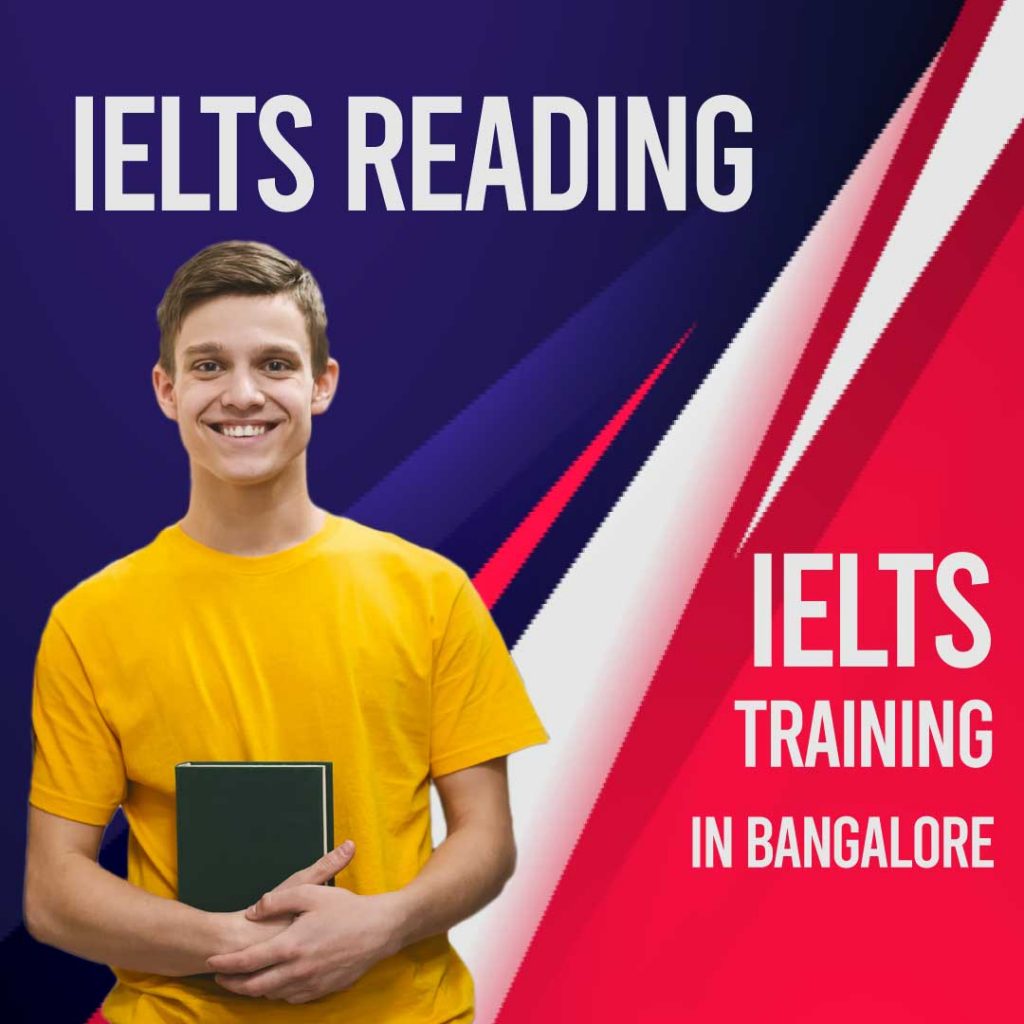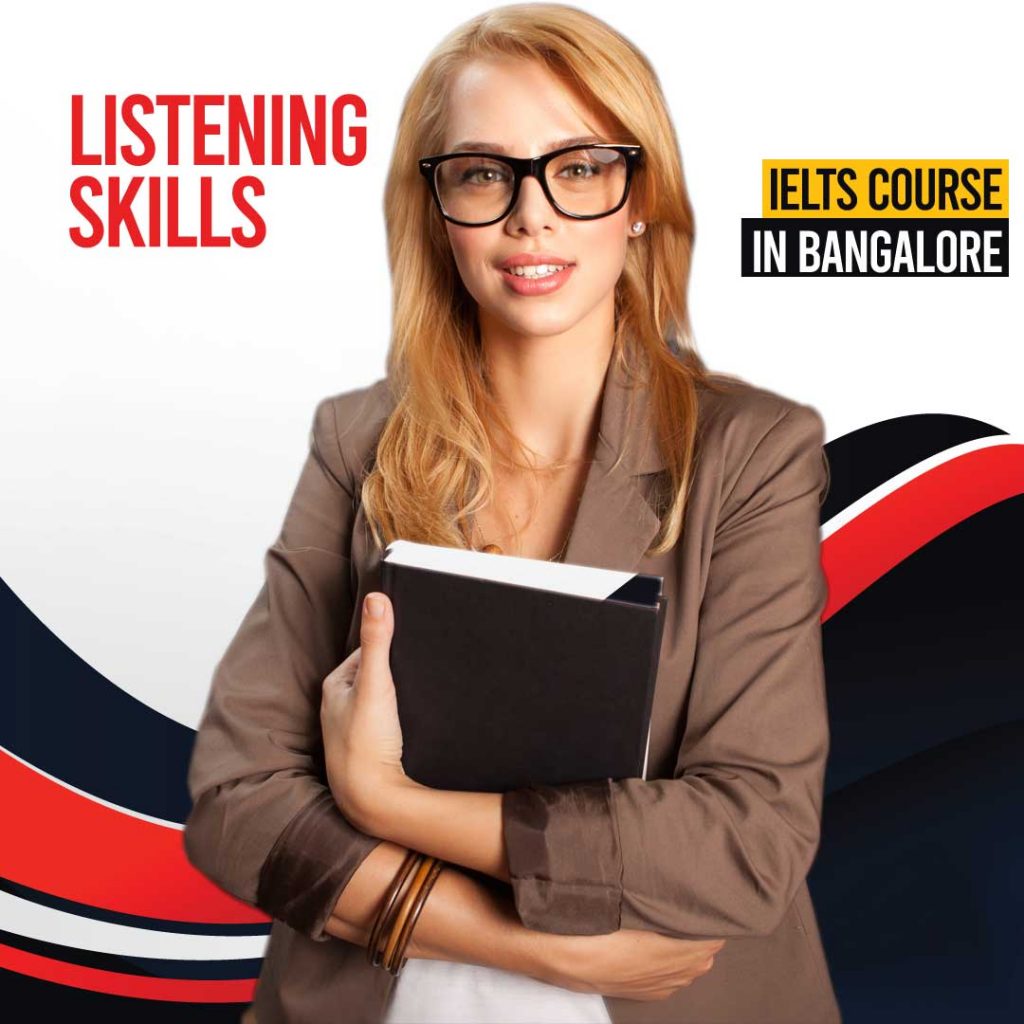Best IELTS Coaching in Bangalore
Best IELTS Coaching in Bangalore: IELTS evaluates the language capability of individuals who need to work or study where English is a dialect of correspondence. In a way, it can be called as a gateway to English speaking countries like USA, Canada, UK, Australia and New Zealand. The exam comprises of a nine-band scale to recognize levels of capability, from band score 1 (non-user) to band score 9 (expert). The four areas where the IELTS check the compatibility of individuals are: Speaking, Listening, Writing, and Reading. If you want to know more about Best IELTS coaching in Bangalore please call our education experts they will help you the complete information related to Best IELTS coaching in Bangalore
Learn more about ielts classes in rajajinagar

There is NO benchmark of minimum passing marks needed in the IELTS exam. An IELTS Test Report Form is provided to all the candidates who had taken up the test. The scores are allotted between band scores of 1 to 9, where a score of 1 refers to non-user while a score 9 refers to expert. The colleges/universities/institutions across the English-speaking countries lay down their own specific benchmark for the admission criteria. For example, most colleges and universities in Canada set a threshold of minimum overall band score of 6.5 and an individual band score of 6.0 in each of the 4 sections (Listening, Reading, Writing & Speaking). For those who are not able to attend the test, a band score of ‘0’ is given. Additionally, Institutions do not consider an IELTS score, which is older than two years, as applicable.
IELTS Online Coaching Click here to learn more
IELTS Coaching in Bangalore
Indian Institute of Foreign Languages offers IELTS coaching in Banglore.
Benefits of IELTS coaching by the Indian Institute of Foreign Languages
- We offer the best training at an affordable price. If you are looking for IELTS coaching in Bangalore, you can consider this institute for your training.
- Flexible batch timings
- Online Classes/ Classroom training
- Certified trainers – Our trainers are certified to take IELTS classes, You can consider this factor for choosing BEst IELTS coaching in Bangalore
- Student support system: Our Student advisors are always available for any help required by student community related to classes
Get more details on IELTS classes in Bangalore
IELTS Writing – Top IELTS Coaching Centre in Bangalore
IELTS writing coaching Bangalore – Tips for attempting the Test Efficiently: IELTS Writing Test (Part III)
There are 2 tasks to be completed in IELTS Writing Test. The candidate needs to write at least 150 words to complete Task 1 and at least 250 words to complete Task 2. The total time allotted to complete both the Writing tasks is 60 minutes. Since Task 2 holds double the weightage as compared to Task 1 in terms of writing score, it is advisable to complete Task 1 in 20 minutes and Task 2 in 40 minutes. The format of writing test for both IELTS Academic as well as General Training is different to some extent. Both these formats and the tips to write them efficiently are described below:

Test Format: IELTS Writing – Academic – IELTS writing coaching Bangalore
Time Allotted: 60 minutes
There are two tasks to be completed – Task 1 & Task 2. Replies to both these Tasks should be written in an academic, semi-formal or neutral style.
Click here to learn more about IELTS online training
Task 1: In the first task, candidate is provided with a diagram, graph, chart or table and is asked to summarise and describe the information in his or her own words. Candidate could be asked to select and contrast information from two sets of data, explain the stages of a procedure, describe the physical attributes of an item and how it works. Task 1 has to be completed in a minimum of 150 words.
Task 2: In the second task, candidate is asked to write an essay in reply to a view point, statement, opinion, argument or some issue. The opinions raised are of generic interest related to academic field. They are appropriate for and easily understood by the candidates willing to pursue undergraduate or postgraduate studies or trying to get professional registration. The essay written should be formal in style. Task 2 has to be completed in a minimum of 250 words.
Learn more about IELTS Online Training
Test Format: IELTS Writing – General Training – IELTS writing coaching Bangalore
Time Allotted: 60 minutes
There are two tasks to be completed – Task 1 & Task 2. Topics provided in General Training module are of basic & general interest.
Task 1: In the first task, candidate is provided with a situation or a persisting problem. He or she has to write a letter, asking for information or demanding solution for the problem while describing the situation. The letter could be personal, semi-formal or formal in style. Task 1 has to be completed in a minimum of 150 words.
Task 2: In the second task, candidate is asked to write an essay in reply to a view point, statement, opinion, argument or a general issue. The essay can be more personal in response and not as formal in style as compared to Task 2 essay in Academic Writing. Task 2 has to be completed in a minimum of 250 words.
IELTS writing coaching Bangalore – Contact US Now
Test Tips:
- In a IELTS Writing test, candidate does not need to answer in the form of right or wrong / true or false / filling the blanks. Hence, the format of writing test is entirely subjective unlike Listening and Reading sections where the responses are objective in nature
- Through a candidate’s written text, the examiner assesses how well he can use his English language skills to present information and describe a particular situation or a view point
- Candidate should study the question carefully so that while answering it, he or she covers all the points raised in the question
- Candidate should strictly follow the minimum word limit for each of the 2 tasks. Candidate is bound to lose marks in case he writes below 150 words for Task 1 and below 250 words for Task 2
- Candidate should use his or her own words while writing the text, because the examiner does not take account of words which are copied from the question
- Candidate should write his response to both the tasks in full as paragraphs, not in note form or in bullet points. A response written as opinion arranged in paragraphs shows candidate’s ability, to organise main and supporting points, to the examiner
- In Academic Writing Task 1, candidate should describe only relevant and key information from data presented in a graph, diagram or table. Candidate should not copy the words or text from the question. Instead, it is better to use synonyms
- Additionally in Academic Writing Task 1, candidate should remain factual while describing the data presented and should not draw his own interpretations or reasons for the data
- Candidates should avoid writing very long sentences in the Writing test. Very long sentences become less coherent which is the main aspect of a writing test which the examiner assesses.
- In Task 2 of the Writing test (both Academic & General Training), candidate should plan his essay structure before writing. He should start with an introduction; followed by opinions to support his statement; real-life instances and example to prove his points; and lastly, a conclusion summarising his point of view
- Candidate should focus on making his point of view and opinion as clear as possible in his for Writing Task 2 (both Academic & General Training). Clarity is another main aspect of a writing test which the examiner assesses
- Candidate should spend around five minutes to plan his essay before starting to write. Also he should spare five minutes at the end to review his answer and check for mistakes
- The last paragraph in Task 2 should be a conclusion which has to be consistent with the opinions and viewpoints included in the essay
- Candidate should focus to spell words correctly. Incorrect spellings could lead to deduction of scores. To avoid spelling mistakes, candidate should try widely used simple English words instead of less used complex ones. For example, use ‘surrounding’ or ‘environment’ instead of ‘milieu’
- Also, some candidates confuse singular and plural nouns. For example, the plural form for many nouns includes an ‘s’ – shops, houses, students, books, issues. Hence, candidate should focus on this when writing
- Candidate is advised NOT to memorise a model answer for the Writing test. The examiner will assess that answer does not match the subject of the essay
- Lastly, Candidate is advised to start reading English texts from Journals, News Papers and Magazines to increase his awareness about general societal issues prevailing and happening in daily life. This will widen his resource bank of opinions and thoughts
IELTS Reading – IELTS Coaching in Bangalore
IELTS Reading Test Bangalore – Tips for attempting the Test Efficiently: Reading Test (Part II)
There are 3 sections in a IELTS Reading Test and the total length of the text lies in the range of 2,150-2,750 words. Each of the 3 sections contains one long text. Texts are genuine and are from magazines, journals, magazines, newspapers and other books. Texts vary from being explanatory and realistic to discursive and methodical. Generally, the texts also contain pictorial representation like diagrams, graphs or images. In case the text includes technical words, then a glossary is also given.

Test Format: IELTS Reading Test – General Training
Time Allotted: 60 minutes
There are three sections
Section 1 includes six to eight small factual texts related to a common topic. This topic is relevant to day-to-day life events in English society. For example, music concert advertisements.
Section 2 includes two short realistic texts with work-related matters being the objective. (For example, searching a suitable job, office rules and guidelines, workplace environment, human resource development and training)
Section 3 includes one longer and more intricate text on a topic of common interest. The topic chosen is authentic and taken from magazines, newspapers and various books including company handbooks and official documents.
Test Format: Reading – Academic (IELTS Reading Test Bangalore)
Time Allotted: 60 minutes
For Academic IELTS, the section structure is similar as mentioned above for General Training IELTS with the major difference being that the texts are written for a non-specialist candidate and are more on academic and educational topics of common interest. Also, the texts are more suitable for candidates seeking professional registration or willing to pursue undergraduate or postgraduate courses in the English speaking countries.
- Candidate should start reading a variety of English texts like news papers, magazines, articles and books as his preparation for IELTS. This will help him to improve his performance in the Reading test by developing his ability to read quickly
- During the Reading Test, a candidate should read and understand each question attentively first before reading the passages. This will make it easier for him to find the answers. Candidate should underline probable answers as he proceeds
- While reading the passage, candidate is advised to read it quickly first time in order to get an idea about it. Candidate should not be bothered in case he does not understand a specific word, since he can get an idea of that by reading the remaining passage. Candidate should then read every question again to focus on that part of the passage in detail which will yield answer to that question
- Candidate should note that the Reading passages always contain the information which is required to answer the question. Candidate should use his own information about the topic to answer the question
- Candidate should take care of his spellings in case he is copying words from the question or reading passage to use in his answer
- The Reading test can also include questions that test candidate’s general understanding of a passage. For example, the question may ask to match the different paragraphs in the text with suitable heading based on candidate’s understanding of the main idea of each paragraph. Candidate should try to underline the key words and ideas in each passage to capture the main context of it. This will also help him to understand the central message of each passage
- Candidate should underline key words as he proceeds to read the passage. For example, if a reading passage includes many city names or languages, candidate should underline them since doing so will make it easier to find such details later if they are asked in any of the questions
- In case, the candidate is asked to label a diagram, he or she will find the words needed for labelling in the text itself. However, candidate should be careful to copy them with the correct spelling
- In case, a candidate is not able to find answer to a particular question, then he should leave it and focus on the next question. Otherwise, he can end up wasting too much time on that question, which may result in very little time for remaining questions. This may further result in candidate not able to answer questions which are comparatively easier due to insufficient time. Hence, student should attempt the unanswered questions at the end, if there is some time left
- Candidates should ensure to write down his answers for the Reading test directly on the answer sheet and not on the question paper. Since the candidate can directly write the answers in the answer sheet, he or she is NOT provided with any additional or extra time to transfer the answers from question paper to the answer sheet (IELTS Reading Test Bangalore)
IELTS Listening – IELTS Course in Bangalore
Listening test pattern and tips to Score 8 band in IELTS
If you are looking for IELTS classes Bangalore Click here
This segment on preparation for IELTS Listening will focus on the four components of the IELTS for test, namely – Listening, Reading, Speaking & Writing and brief about the pattern of each of these four components. The Listening, Reading and Writing tests are conducted on the same day while the Speaking test can be taken up to seven days after or before the other three tests. The order in which these tests are conducted is listening, reading and finally writing. There is no break between these three tests. The following segment highlights various aspects of Listening Test.

IELTS Classes Bangalore for LISTENING
In the listening test, a pre-recorded tape is played and candidates are provided with a headphone to listen discussions / conversations / speeches by various speakers. Candidates must check the sound quality in their headphone before commencement of the test. In case of any malfunction, candidates should immediately contact the invigilators present at the test centre.
Timing
The time allotted in IELTS Classes Bangalore Listening Test is 30 minutes to answer the questions and additional 10 minutes to transfer the answers from question paper to the answer sheet. Hence the total time provided for completion of Listening test is 40 minutes.
Questions.
The total number of questions to be answered is 40 and all of them are compulsory to be answered. A range of question forms are used which includes following:
- Multiple choice questions
- Labelling of a diagram or a geographical map
- Fill in the blanks in a given note, summary or a sentence
- Fill in the blanks in a flow-chart
- Fill in the blanks in a Table
- Short-answer type questions
Test Parts
There are 4 sections in a Listening Test:
Section 1 entails a discussion in the form of a conversation among two people related to everyday social context (For Example, a conversation involving enquiry about booking of a concert).
Section 2 is a monologue or a speech given by a person, mostly to articulate his or her intellectual thoughts and sometimes to directly address other person or audience. The context of this monologue is related to daily life social context. (For Example, a speech about harmful effects of green house gases).
Section 3 is a discussion among two to four people laid down in an educational or training perspective (For Example, a university lecturer and a student having a conversation on a research project or a group of students sharing their experience on assignments they completed during winter break).
Section 4 is again a monologue or speech on an academic topic (For Example, a lecture on ancient artefacts).
Each of the above sections can be heard only once. To give objectivity to the task, a variety of voices and accents are used in all the sections.
Skills Assessed
A broad range of candidate’s skills are tested in the Listening test which includes:
- Comprehending the main thought of a speech
- Understanding of particular factual data
- Following the development of an argument
- Identifying opinion, outlook and aim of a speaker
Marking
The listening test carries a total of 40 marks for 40 questions, which implies that each correct answer gets 1 mark. The marks out of 40 are converted as per the IELTS scale to a 9 band score. Scores are awarded in whole as well as half bands (For example, 7 & 7.5). There is no negative marking for the wrong answers; hence the candidates can attempt all the questions.
IELTS Speaking – IELTS Academy Bangalore
Speaking test pattern and tips to score 8 band in IELTS
This segment on preparation for IELTS Coaching Bangalore for Speaking will focus on the four components of the IELTS Coaching Bangalore for Speaking test, namely – Listening, Reading, Speaking & Writing and brief about the pattern of each of these four components. The Listening, Reading and Writing tests are conducted on the same day while the Speaking test can be taken up to seven days after or before the other three tests. The order in which these tests are conducted is listening, reading and finally writing. There is no break between these three tests.
The following segment highlights various aspects of a IELTS Coaching for Speaking Test.
IELTS SPEAKING
The speaking section is accomplished as a one-to-one interview with an examiner. The examiner examines the candidate while he or she is speaking. Moreover, the speaking section is recorded for supervising and for re-evaluation if the candidate decides to plead against the bands he scored.
TIMING
The Speaking Test takes 10 to 14 minutes to be conducted.
TASKS
The speaking test is similar for both Academic and General Training IELTS. There are 3 speaking tasks to be completed by the candidate in both IELTS Academic as well as General Training.
Task 1 – Introduction and Interview (4 to 5 minutes)
The examiner shall introduce himself / herself and ask for the candidate’s introduction. The examiner will also confirm the candidate’s identity. Hence it is a necessity for the candidate to carry his / her identity proof at the time of speaking test. The examiner asks familiar questions on common topics from the candidate, for example, house, family members, profession, education and hobbies.
Task 2 – Lengthy talk by Candidate (3-4 minutes)
The examiner provides the candidate with a task card that contains a specific topic on which the candidate needs to speak non-stop. This can be treated as a sort of extempore where the candidate has to speak impromptu. However, the examiner will provide the candidate 1 minute to note down the specific points he / she would like to cover in their speech. The candidate is provided a pencil and paper to make notes. The candidate has to talk for 1 to 2 minutes on the topic. The examiner can ask the candidate additional one to two questions on that topic.
Task 3 – One to one discussion (4-5 minutes)
In the last task, the examiner asks additional questions which are related to the topic of Task 2. These questions provides an opportunity to the candidate to further discuss the conceptual issues and ideas with the examiner.
SKILLS ASSESSED
A broad range of candidate’s skills are tested in the Speaking test. In all the speaking tasks, a candidate is assessed for his or her
- Ability to converse his or her views and information on day to day topics and general experiences and conditions by answering a variety of queries
- Ability to converse and talk at length on a specific topic given to him / her using suitable language and organising the views and thoughts rationally
- Ability to articulate and validate his / her outlook and to examine, discuss and contemplate about issues
MARKING
The candidate is assessed for his or her performance on each of the 2 tasks by recognised and certified IELTS examiners as per the IELTS Writing test assessment criteria (For Example, Lexical Resource, Fluency & Pronunciation, Task Achievement, Coherence and Cohesion, Grammatical Range and Precision). Scores are awarded in whole as well as half bands (For example, 7 & 7.5).
Also, learn more about Career English at IIFLs



